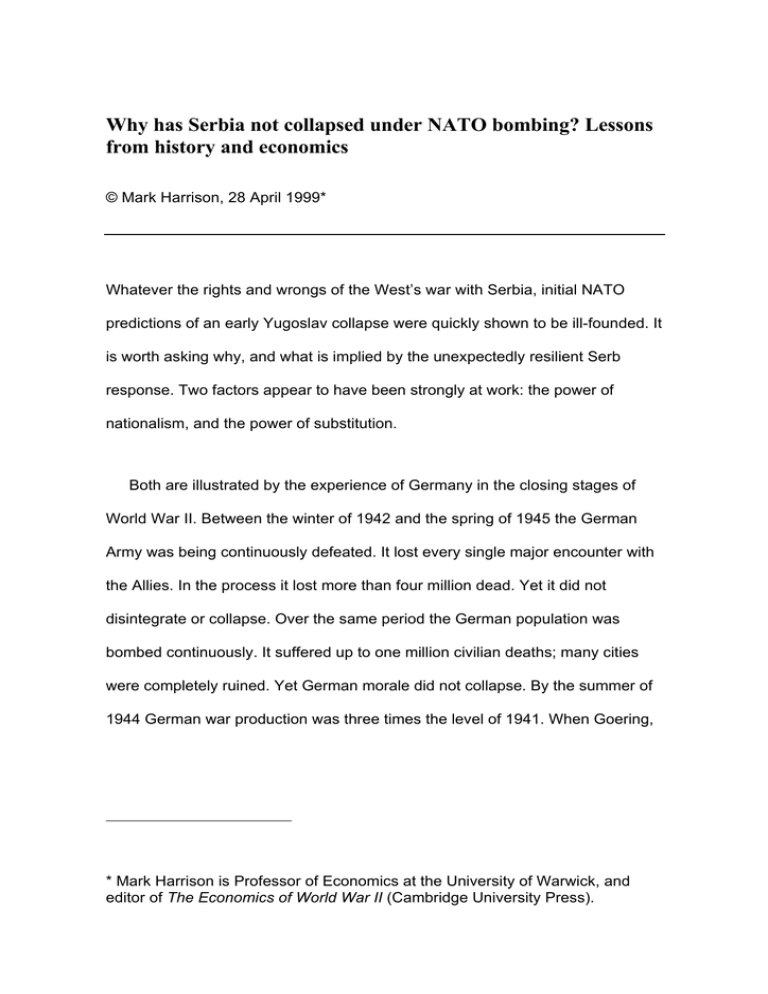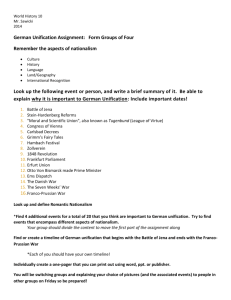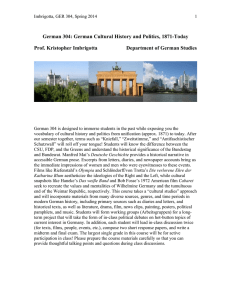Why has Serbia not collapsed under NATO bombing? Lessons
advertisement

Why has Serbia not collapsed under NATO bombing? Lessons from history and economics © Mark Harrison, 28 April 1999* Whatever the rights and wrongs of the West’s war with Serbia, initial NATO predictions of an early Yugoslav collapse were quickly shown to be ill-founded. It is worth asking why, and what is implied by the unexpectedly resilient Serb response. Two factors appear to have been strongly at work: the power of nationalism, and the power of substitution. Both are illustrated by the experience of Germany in the closing stages of World War II. Between the winter of 1942 and the spring of 1945 the German Army was being continuously defeated. It lost every single major encounter with the Allies. In the process it lost more than four million dead. Yet it did not disintegrate or collapse. Over the same period the German population was bombed continuously. It suffered up to one million civilian deaths; many cities were completely ruined. Yet German morale did not collapse. By the summer of 1944 German war production was three times the level of 1941. When Goering, * Mark Harrison is Professor of Economics at the University of Warwick, and editor of The Economics of World War II (Cambridge University Press). who bore chief responsibility for German air defences, fled Berlin in 1945 his car was applauded in the streets. The factors behind this are not far from those underlying the present-day Serb resistance. When war breaks out, nationalism takes over from morality. Germany sustained its war effort for years despite both overwhelming odds and an immoral cause. Regardless of their attitudes to Hitler and National Socialism, German soldiers and civilians were willing to fight, tighten belts, and die for two main reasons. First, they hated the British and American flyers who bombed them by night and increasingly by day. Secondly, they feared the Russians; knowing more or less about German atrocities in occupied Russia, they expected (correctly, to some extent) that the Russians would do the same in revenge if they ever stepped on German soil. When Neville Chamberlain declared war on Germany in 1939 he thought it was a matter of morality versus brute force. However, World War II was actually won by brute force, not high moral tone. The Axis powers were not particularly weakened by being led by vile dictators. Only the huge economic superiority of the Allies translated into men, ships, planes, bombs, tanks, guns, shells, and bullets brought about their defeat. What were the real effects of bombing Germany in the years from 1942 to 1945? Bombing Germany imposed costs on both sides. Bombing Germany was immensely costly to the Allies in tens of thousands of expensive long-range 2 four-engined bombers and highly trained aircrews. This cost was ultimately reflected in resources diverted from the invasion forces for Italy in 1943 and France in 1944. The costs to Germany were of several kinds. Hitler had to take aircraft from the eastern front (where they were badly needed) to defend German airspace (where they were needed even more). He had to devote huge resources to air defence. German military industry had to be dispersed to small hidden factories far removed from the specialised mass production of the American and Russian arms and aircraft industries; this made German weapons more expensive and fewer of them were made as a result. Most of all, German civilians had to endure fierce deprivations and hardships. The German economy did eventually collapse. How was this achieved? Only when bombing was combined with pressure on the ground. The collapse of the German economy can be dated from the summer of 1944, virtually from the moment of the Allied invasion of France. Even so the process took nine months, culminating only in March 1945. There were two stages. In the first stage war production peaked and no more resources could be switched out of the civilian economy. It became clear that the war would be decided in the next few months. There was no point trying to develop new weapons, so military investment and R&D were cancelled to increase resources for fighting. The second stage began almost immediately; war production itself was stepped down so that war workers could be conscripted; they would now fight to the last bullet (since bullets were no longer being made) and then the war would be over, whether won or lost. 3 How did the German Army and economy last so long? Because of nationalism combined with the power of substitution. Substitution is a fundamental concept from economics; it refers to the way in which a person who find the price of one thing rising will turn to another as a substitute. There is always a cost to substitution, but its limits are wide. Its power has been greatly neglected by non-economists in the wars of the twentieth century. Too many think cutting off imports of ‘essential commodities’ or bombing ‘key installations’ will cause sudden economic or military collapse. Elementary economics, however, suggests that if the resource really matters the adversary will quickly find alternatives and substitute them for the resource denied or destroyed by our action. If oil is denied, then other sources of energy will be found or people will walk. If television transmitters are destroyed, then more traditional means of communication will be resurrected. If meat is restricted, people will eat bread. If wheat is in short supply, then bread will be made of rye, animal feeds, even sawdust. If armour steel is short, human lives will be expended instead. Everything will have a cost, but as long as the national will is present things will be kept going. Mancur Olson once wrote that in war there are no essential commodities, only essential uses. It’s essential to feed people and tell them what’s happening, but there are many ways of doing so. Under blockade or bombing, domestic substitutes can be found for missing commodities to protect existing uses, even if at rising cost. If the cost of substitution is excessive, inessential uses can be cut back. Thus Britain survived two World Wars without malnutrition, 4 despite initially importing 80 per cent of the calories consumed by its people. Everybody ate more vegetables, and less meat (to Churchill’s disgust), and many ‘dug for Victory’. Of course substituting and cutting back are easier the richer you are; Britain was rich in 1939, and Yugoslavia today is a poor country -- much poorer, relatively, than wartime Germany. But substituting and cutting back are also easier when combined with the power of nationalism. The experience of World War II also shows that even relatively poor economies like Italy and Japan did not collapse suddenly. They collapsed gradually, and then only when seriously attacked, in Italy’s case by invasion, in the Japanese case by the US Navy seriously getting in among the Japanese islands to cut off trade. At this point production did collapse because substitution and cutting back on inessential uses became prohibitively expensive. Even then, the regime itself collapsed politically only after a loss of will in which everyone tried to save themselves, as happened in Italy. In Japan nationalism was so strong that there was a surrender without political collapse. NATO hopes for victory over Milosevic without a costly ground invasion rest upon the prospects of a political collapse without a military collapse, but the conditions for this appear very difficult to create. In the early days of the bombing campaign against Serbia, NATO spokesmen talked about an imminent collapse of Yugoslav military-economic capabilities as if the daily pounding was ‘weakening the dam’, or pushing Serbia over a ‘precipice’. More recently oil blockade has been portrayed as an effective 5 instrument for hastening Yugoslav economic collapse. The next time you hear it said, you know it’s wishful thinking. The fact is that economies which have not been invaded, even poor ones, do not collapse in days or even weeks. There is no economic precipice over which Yugoslavia may now be toppling; at best (from NATO’s standpoint) there is a gentle downhill slope. The last, grimmest lesson of history is this. In World War II, even after years of Axis defeats, ultimately nothing sufficed against Germany short of its physical occupation. The combined powers of nationalism and substitution ensured that this action, which took place in the first half of 1945, cost nearly a million Allied (mostly Soviet) lives. In Japan’s case physical occupation took fewer Allied lives; the atomic bomb did instead of a contested invasion. 6


